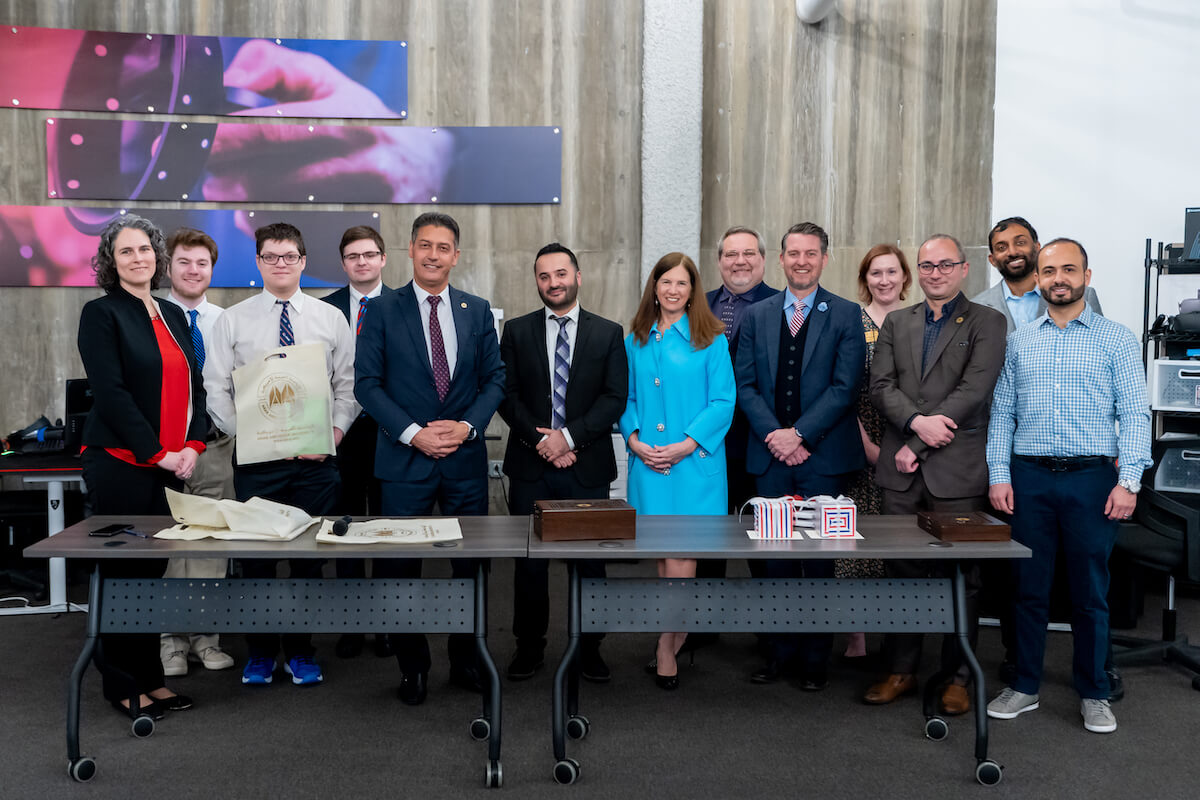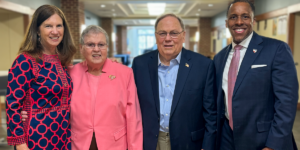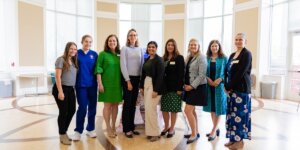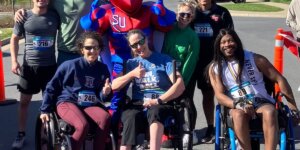Shenandoah University and Arab American University (AAUP), a private Palestinian university in Jenin, jointly signed a memorandum of understanding on Friday, Feb. 25, further solidifying the two universities’ collaborative efforts and bolstering their long-term international partnership.
The signing ceremony, which took place in the Shenandoah Center for Immersive Learning (SCiL) Lab in the Health and Life Sciences Building, capped a weeklong visit to Shenandoah University by three representatives of AAUP, during which members of both universities engaged in curricular development, research, and administrative activities.
AAUP’s visit to Shenandoah and the MOU signing emerged from an ongoing collaborative research project funded through a $40,000 seed grant from the Institute of International Education (IIE) and sponsored by the U.S. Department of State’s Palestinian Affairs Unit. The project, which began during the Fall 2021 semester and is led by Principal Investigator Mohammad F. Obeid, Ph.D., assistant professor and director of Shenandoah’s virtual reality (VR) design program, involves the development of a proof-of-concept virtual reality platform to help students learn fundamental skills taught through nursing school labs.
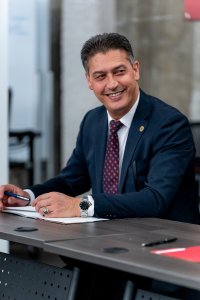 Shenandoah University President Tracy Fitzsimmons, Ph.D., and AAUP Vice President for Medical Faculties’ Affairs Mohammad Asia (pictured right), Ph.D., signed the MOU during the ceremony. Representatives from both universities then engaged in a gift exchange.
Shenandoah University President Tracy Fitzsimmons, Ph.D., and AAUP Vice President for Medical Faculties’ Affairs Mohammad Asia (pictured right), Ph.D., signed the MOU during the ceremony. Representatives from both universities then engaged in a gift exchange.
AAUP President Assistant Bara Asfour and Ahmad Ewais, Ph.D., associate professor of computer science and director of eLearning at the university, joined Dr. Asia on the visit to Shenandoah.
“We’re fortunate to establish an international partnership such as this one with AAUP,” Dr. Obeid said of the MOU. “This serves as grounds for various potential initiatives with reciprocating benefits including joint research and curricula. Additionally, it allows for the internationalization and cross-disciplinary involvement of programs and activities at both institutions.”
Dr. Asia praised the work of the SU community members involved in the ongoing collaborative efforts and spoke highly of Shenandoah’s technology and health care programs, which have played key roles in an interdisciplinary project that has required communication and cooperation from VR, computer science, nursing, health professions and medical programs at both universities.
“There is something special about this campus,” Asia told audience members during the ceremony. “This is a true caring campus.”
Asia also echoed Obeid in praising the efforts of Shenandoah students Cole Herndon ’22, Orion Tighe ’22, and John Ulbrich ’22, who play key roles in the research grant project, which Obeid noted also serves as this group’s senior design project as members of SU’s first Bachelor of Science in VR Design class. Obeid indicated that as part of the project, the students had to familiarize themselves with the fundamentals of nursing and translate that into engineering language that could then be used in a technical project.
There will be people whose lives will be saved down the line because of projects like this. And that’s not overstating it, because as part of this, nursing students are going to learn more, and they’re going to learn better and more quickly, and they will be out caring for others. Somewhere down the road, there will be families grateful for well-trained nurses, and part of that will come from this project. I think that’s a really powerful thing.”
Tracy Fitzsimmons, Ph.D., Shenandoah University president
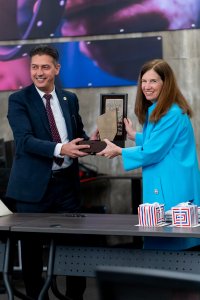 Fitzsimmons called the project a small step that, in turn, leads to larger steps, which ultimately open the door to “major cross-cultural and international understanding and cooperation between countries.” She added that future collaborations would arise from AAUP’s visit to Winchester, as they will when Shenandoah representatives return the favor and travel to Palestine at a future date.
Fitzsimmons called the project a small step that, in turn, leads to larger steps, which ultimately open the door to “major cross-cultural and international understanding and cooperation between countries.” She added that future collaborations would arise from AAUP’s visit to Winchester, as they will when Shenandoah representatives return the favor and travel to Palestine at a future date.
Fitzsimmons also commended the work of Younus Mirza, Ph.D., SU’s director of Global Virtual Learning, for helping Shenandoah envision and realize broader partnerships on an international scale. Dr. Mirza described the SU-AAUP virtual reality project as a sister project of the Collaborative Online International Learning (COIL) program that he helped launch as part of the Jamal Barzinji Project for International Collaboration to Advance Higher Education.
“The project represents the growing importance of global virtual learning, where schools collaborate primarily virtually but meet to sign important documents, learn about each other’s campuses and solidify relationships,” Mirza said.
Obeid’s team continues to work on the research project, which is set to conclude in August 2022. As indicated by many on Feb. 25, however, the collaboration between SU and AAUP is expected to continue beyond that project.
